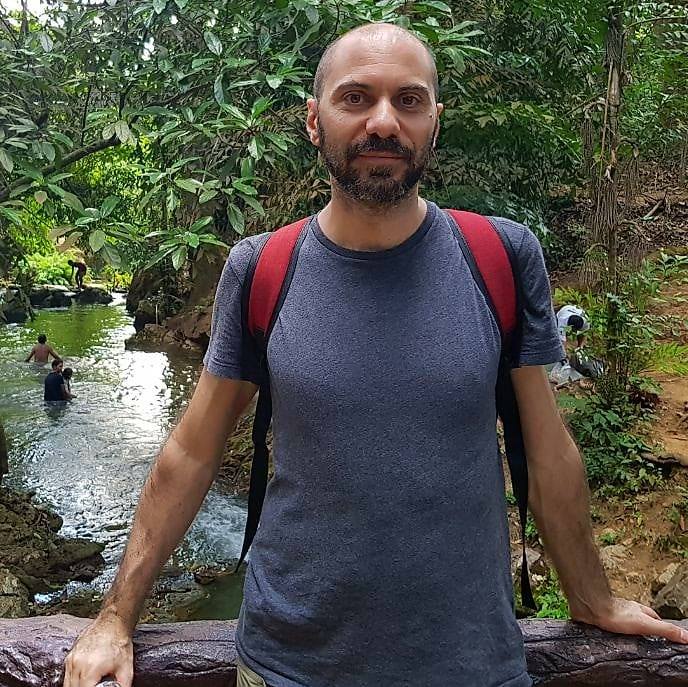
Astrophysicist Daniele Malafarina: «We will lose our technological edge and bit by the bit will go back to living in caves»
Daniele Malafarina was born in Italy, Milan. That is where he got his Masters and PhD. His passions growing up were mostly mathematics, astronomy and philosophy. During his PhD, Daniele moved to Poland and realized that he wanted to be in an environment that was changing and evolving. So, at that time, he chose to investigate more developing countries, such as India and Kazakhstan.
We talked to Daniele about stellar explosions, aliens, life on other planets and the future of our civilization.
— We know that you study Astrophysics, mainly gravitational collapse. There are so many stellar explosions in the Universe, and some mechanisms of supernova’s birth are still unclear and understudied. What do you think could be the reasons for such explosions?
First of all, there are two ways of studying this. The thing that I am interested in the most is gravity, mainly the way gravity works. Everybody has an intuitive understanding of gravity, but mathematically it is difficult to comprehend as it is probably the most mysterious of all forces.
The supernovae explosion happens at the core of a star when the core collapses and the outer layers are ejected in space. The first way is to try to understand precisely how they explode, which is still a mystery because people have not been able to put together all the elements yet. If you want to do that then you need to use all of physics.
This is a situation where all knowledge should be applied: gravitation, electromagnetism, nuclear forces, thermodynamics, fluid dynamics and so on. It is very complicated. I am not really interested in that, I know that when supernovae explode the core of the star collapses under gravity. And I am interested in how gravitation behaves in such extreme situations. In order to be able to solve the equations by hand, we need to make things as simple as possible. So I consider models where there is just gravitation, point particles that collapse under gravity without rotation, electromagnetism and turbulence.
What happens when these particles under their own weight collapse towards the centre? What general relativity tells us is that you may form a neutron star or a black hole but at the same time we know that general relativity is not the last answer, there must be something else, a better theory that describes gravity when the field becomes so strong. So by studying these simple models, I try to get some hints of what this new theory of gravity could be and as a consequence, I try to see if other objects besides neutron stars and black holes can exist or if gravity behaves in some other way, for example, if it is possible that all the matter of the collapsing core bounces back and is ejected in the explosion.
Essentially my point of view is to make things simple by removing everything that is not crucial to find the core of understanding how gravity works.
Then if you want to have some tests, those tests will have to be in supernova explosions because it’s where gravitational collapse happens. But unfortunately, stars are very big, they can be tens of thousands of kilometres in diameter or more. Most of the star is gas that will explode in the supernova and only the core is the part that will collapse. And the core can be some 500 kilometres in diameter.
— What do you think of paleocontact theory? Do you believe that it is extraterrestrial creatures that created life on earth?
There are different types of explanations in science. We look for explanations that tell you how something works in order to understand why something happens. Now the question is: how did life begin?
If we believe that aliens came and brought life to Earth that doesn’t answer the question. That is one type of explanation that moves the question somewhere else, it is not a scientific way of explaining. Unless there is good evidence to believe that it happened, scientifically there is no need to believe that.
It turns out that life could easily have developed on Earth by itself. But at the same time, one needs to have an open mind, it is possible and you cannot exclude that it started elsewhere. It may be good to keep this theory in case some new evidence comes out. If we believe that life came from other planets, there are two ways it could have happened: one is intentional.
Some alien civilization could have brought life to Earth. This is very complicated because we don’t have any evidence even that other civilizations exist. But that would make things easier because aliens would have known what to put and where to put it: they would come here because here the conditions are good.
The other possibility is that life came accidentally: it was ejected from another planet by an asteroid impact, then some bacteria or spores that could survive the travel through space could have reached a new planet. We know that some kinds of life can survive being ejected from a planet and also entering the atmosphere. We also know that some kind of life can survive in space for a period of time. We don’t know if it can survive long enough to travel from a planet to another. If life formed on Mars or on Venus and then came to Earth then it is easier because it would have to survive a trip in space only for a short time, a few thousand years, maybe less.
Life from another solar system would probably take millions of years to move to Earth. So it is unlikely that life could have survived such a long trip. But who knows, maybe there are such life forms that could survive under such conditions.
— Do you believe that aliens created us, humans?
So, there is good evidence that all life on Earth comes from one common ancestor. All life has the same origin. If we were put here by aliens then everything should have been put here by them, starting from bacteria up until everything else. If they could have created life on Earth they would probably put some bacteria at first, because we see that everything has a common origin.
Today the tree of life on Earth can be studied with DNA and all indications point to a common ancestor. Also, aliens would have had to come here billions of years ago to put life on Earth. This means that they would have had a civilization already capable of travelling to stars a long time ago. We don’t have any evidence about it right now. In fact, most of the evidence that we have suggests that it takes time for a civilization to appear and it is quite likely that 4 billion years ago there was nobody.

— I know that it is now practically impossible to travel to Mars because the distance between two planets is approximately 54.6 million kilometres. Do you think we can decrease the distance from Mars to Earth? Maybe using a theory of general relativity by, for instance, bending space?
Well if that is possible there is no point in using it for Mars. It would be better to use it for stars that are around 20 light-years away. Mars gets closer and further as the planets move around the Sun. To travel to Mars the best thing would be to have a better propulsion system. We still use chemical rockets and with those, it is a long trip. But if we have a better propulsion system, maybe nuclear fuel or something even better, then we can make this trip shorter, maybe even to a few weeks.
To bend space we should use wormholes to travel. This is only a theory for now. There is no practical application yet. To build a wormhole, the theory says that we need some material that has negative energy density, that is a type of matter which doesn’t exist as far as we know. If it is possible then maybe one day we will be able to travel to stars that are several light-years away.
— What about black holes, is there a possibility to decrease distance through a black hole by avoiding fatal consequences?
If you enter a black hole, you horribly die, destroyed by tidal forces as you fall to the centre. If you want to travel you will possibly use a wormhole that is similar to the black hole from the outside.
If you pass through the horizon of a wormhole then you will end up in another part of space. So from the outside, both black holes and wormholes look similar, but what happens once you pass the horizon may be very different. Wormholes, as said, are only a theory of course. You would have to build one artificially and that is a big problem. Black holes may form naturally when stars explode, but a natural wormhole may not exist. But nature tends to surprise us, so maybe one day we will find that wormholes do exist, who knows? For now, we cannot really tell the difference between wormholes and black holes and the indications we have are that the objects we see in space are black holes.
Still, more than 50 years ago people believed that wormholes were more probable to appear than black holes. But then things shifted, our understanding of stellar evolution changed and black holes became the most likely candidates.
Also, a black hole is just a mass, so black holes are harmless as long as you are far enough. You can be safe as long as you stay further from the black hole the same way as you are further from the Sun. There is no danger unless you get too close.
— Now I would like to ask some questions from our audience, they have prepared some questions for you as well.
Will a black hole absorb our planet one day?
As of now, there is no risk of black holes passing near our planet: not now or in the next billions of years. At some point, the Sun will become a red giant and when it becomes a red giant, life on Earth will be gone. The Sun then will become a white dwarf, because it is too small to become a black hole. Afterwards, all the matter in galaxies, bit by bit, will be absorbed into the central black hole. And possibly trillions of years from now everything will be absorbed by black holes, but that’s a very long way from now. The universe is 13.7 billion years old, and black holes absorbing everything will maybe happen after several trillion years. Nothing to worry about.
— Is there life on other planets?
Life for sure. There are so many stars in the Universe, so many stars in our galaxy and so many planets and the conditions vary from place to place, so it is impossible that Earth is the only planet to have life.
Even within our galaxy, I am absolutely sure there is life. There could be bacteria, plants and animals, and maybe a few with civilizations. Bacteria are the easiest ones, as life probably appears once the conditions are right. So probably there are lots of planets with bacteria on them. Then to have complex life things are more difficult. The conditions must become stable enough for a long time. So there are probably fewer planets with complex life in the galaxy. Civilizations are even more difficult, as a lot of different things have to come together to produce a civilization. So there may be some other civilization in our galaxy, but if there are, they are probably very few.
— Do you think that civilizations on other planets prepare to conquer Earth?
I don’t think so. There is no point. Because on Earth there are resources and there are so many other places to get those resources without competition. If they want water, there is lots of water in every solar system. If they want metals, there are metals on asteroids and other planets. If they can travel to the stars, they won’t need anything that we have.
The main problem that we have with space exploration is sending stuff in space. Because sending 1kg material in space costs a lot of money. If we find a technology that makes it easier and cheaper, then why should we go back?
I believe that an advanced civilization that can reach the stars would just stay in space. Once it took you thousands of years to leave a planet you will not return. Maybe they would land on a planet for exploration, but they would not settle there. It is like when you finally move from your parents and have your own apartment, there is no need for you to move back. You can go visit, but you won’t move back with them.
So, I think civilizations will have no interest in actually coming here for resources or to live because they will be able to create the environment that they need in space.
— Is there a possibility for time travel in the next few decades?
Time travel cannot be excluded in theory, the laws of physics allow this to happen. To the extent that some of my colleagues even organized a couple of conferences on time travel.
However, there are some limits that we cannot cross. There are tight restrictions to time travel and what may be possible. So I doubt that we can travel in time in the way we see in movies. Imagine yourself. You are made of lots of particles and each particle has a trajectory through space and time. And you can imagine this as a line that traces where you are going and where you’ve been. Now, these trajectories cannot cross due to mathematical reasons. Basically, you cannot meet yourself in the past, your particles cannot cross. So, on Earth, it will be very complicated to have time travel avoiding these restrictions.
But it is possible in principle to go back in time in a different portion of the universe. For instance, you could travel back in time to a different solar system and look at Earth from there. But for now, this is just a theory. There is no practical way of achieving it and not even in a few decades.
– If you have watched Interstellar, do you believe that the same scenario will happen to Earth?
We are already looking at some ways to leave Earth. We evolve as a civilization and if we want to keep on spreading and growing we need to leave the planet. Otherwise, soon it will no longer be sustainable.
One of the nice things about Interstellar is that the problems that happened to Earth were not necessarily caused by humans. They didn’t say anything about it. Those circumstances just happened. But we are causing climate change on Earth right now and even if we didn’t, the climate would change by itself eventually. As the climate changes the planet adapts but societies usually collapse.
A stable climate is important for our society. Climate change can cause lots of problems to humans and our way of living, not to plants and animals. Some species will disappear and other species will appear. Life on Earth will survive. Over geological time scales, Earth will be fine, the biosphere will be fine, even humans will be fine. Access to technology may not be fine. Our modern lifestyle may not be fine. The thing that is at risk is not our survival, but our comfortable way of life. Even if we don’t do anything, the climate and conditions for life will change by themselves and we should learn how to adjust before it is too late.
We don’t need to depend on our ecosystem anymore, we should get to a point where we create our own ecosystems, and one way to do it is to leave the planet.
If we don’t do this, our evolution will be tied to the changes of the ecosystem on Earth, and everything that doesn’t evolve will de-evolve. When we will spend too many resources trying to maintain our society instead of investing in improving it, then we will start to de-evolve. We will lose our technological edge and bit by the bit will go back to living in the caves. And then slowly disappear, like every other species.
As of now, we are slaves to biological evolution, to the ecosystem, but there is another driver that is faster and stronger. That is cultural evolution. Cultural evolution helps us to know what happens around us, how we think and how we live. For now, we are slaves to cultural evolution, too. Ideas, economic systems, religions, traditions and customs all develop randomly. They compete with each other and while some survive, others disappear. However, we could be in charge of our own cultural evolution. We should decide in which direction we want to go as a species because that is the best way forward for all. We are not there yet.
We are still slaves to wars, political games and random cultural changes. These are just cultural mutations competing with each other, just as species compete biologically for survival. But this stops us from evolving consciously in many different directions we could choose to go. That’s a waste of energy and it does not guarantee our survival. Someday we may take a direction that will force us to spend a lot of money and resources on things that we take for granted today.
And then we will lose technology without even realizing it. My grandparents did not have a fridge at home when they were kids, which was normal for them. Someday our grandchildren might live in a world without a fridge and that may be normal for them. This has happened to civilizations on Earth over and over in history. If we don’t act quickly, then we may also lose what we have built overages and never make it to space.





